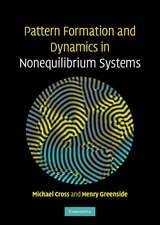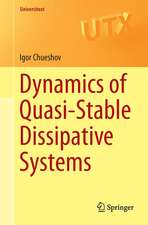Unifying Themes in Complex Systems: Volume IIIB: New Research
Editat de Ali A. Minai, Yaneer Bar-Yamen Limba Engleză Paperback – 8 ian 2007
The Third International Conference on Complex Systems attracted over 400 researchers from around the world. The conference aimed to encourage cross-fertilization between the many disciplines represented and to deepen our understanding of the properties common to all complex systems.
| Toate formatele și edițiile | Preț | Express |
|---|---|---|
| Paperback (2) | 646.75 lei 6-8 săpt. | |
| Springer Berlin, Heidelberg – 8 ian 2007 | 646.75 lei 6-8 săpt. | |
| Springer Berlin, Heidelberg – 21 dec 2006 | 953.52 lei 6-8 săpt. |
Preț: 646.75 lei
Preț vechi: 760.88 lei
-15% Nou
Puncte Express: 970
Preț estimativ în valută:
123.76€ • 129.38$ • 104.59£
123.76€ • 129.38$ • 104.59£
Carte tipărită la comandă
Livrare economică 07-21 martie
Preluare comenzi: 021 569.72.76
Specificații
ISBN-13: 9783540358640
ISBN-10: 3540358641
Pagini: 406
Ilustrații: XXIX, 375 p.
Dimensiuni: 152 x 229 x 30 mm
Greutate: 0.59 kg
Ediția:2006
Editura: Springer Berlin, Heidelberg
Colecția Springer
Locul publicării:Berlin, Heidelberg, Germany
ISBN-10: 3540358641
Pagini: 406
Ilustrații: XXIX, 375 p.
Dimensiuni: 152 x 229 x 30 mm
Greutate: 0.59 kg
Ediția:2006
Editura: Springer Berlin, Heidelberg
Colecția Springer
Locul publicării:Berlin, Heidelberg, Germany
Public țintă
ResearchCuprins
Complex Behavior of Simple Systems.- Thresholds, Bifurcations and Mental Control: An Application of Nonlinear Dynamics to Psychotherapy.- Study of Pattern Formation by Peafowl using LEM Multi-Agent Simulator.- The Contribution Of Complexity Theory To The Study Of Socio-Technical Cooperative Systems.- Complexity Theory of Art: Recent Investigations.- Complexity, Emergence and Pathophysiology: Using Non-Adaptive Inflammatory Response.- Self-Organization of Population Structure in Biological Systems.- Spatial Periodicity in Mycelial Fungi Growth with Respect to Their Life Strategies.- In Search of Scaling in Brain.- Co-operation in the Brain in Higher Cognitive Functioning.- A Complex System for the Visualization of Music.- Plasma Experiments with Relevance for Complexity Science.- Ball Lightning as a Self-Organized Complexity.- Self-Organisation in Metabolic Pathways.- Modelling Bacterial Hyperstructures with Cellular Automata.- Environmental Complexity: Information For Human-Environment Well-Being.- Use of an Object-Based Model to Represent Complex Features of Ecosystems.- Complexity of Predictive Neural Networks.- Locating Self-Organization at the Edge of Chaos.- Strategic Planning Amidst Massive Uncertainty in Complex Adaptive Systems: the Case of Defense Planning.- Formalizing the Gene Centered View of Evolution.- The Structure of Instantaneous Phase Resetting in a Neural Oscillator.- On Analysis of the Periodicity Attributes of the Photo-Plethysmograph Signal to Assess the Cardiovascular State.- Pattern Formation by Autonomous Mobile Robots.- Punctuated equilibrium, modularity, and A-Life.- Agent-based Modeling of Disrupted Market Ecologies: A Strategic Tool to Think and Learn With.- Considerations about universality in phase-ordering of binary liquids.- Complexity and Simplicity in Ecosystems: The case of forest management.- Cell State Dynamics and Tumorigenesis in Boolean Regulatory Networks.- The role of spontaneous pattern formation in the creation and maintenance of biological diversity.- Developing Understanding of Ecological-Economic Systems.- Self-Healing Structures in Amorphous Computing.- Phase Transitions in the Computational Complexity of “Elementary” Cellular Automata.- Chaotic Dynamics of Tumor Growth and Regeneration.- Language as a Model of Biocomplexity.- Social Constraints and Cybernetic Explanations.
Textul de pe ultima copertă
In recent years, scientists have applied the principles of complex systems science to increasingly diverse fields. The results have been nothing short of remarkable: their novel approaches have provided answers to long-standing questions in biology, ecology, physics, engineering, computer science, economics, psychology and sociology.
The Third International Conference on Complex Systems attracted over 400 researchers from around the world. The conference aimed to encourage cross-fertilization between the many disciplines represented and to deepen our understanding of the properties common to all complex systems.
This volume contains over 35 papers selected from those presented at the conference on topics including: self-organization in biology, ecological systems, language, economic modeling, ecological systems, artificial life, robotics, and complexity and art.
ALI MINAI is an Affiliate of the New England Complex Systems Institute and an Associate Professor in the Department of Electrical and Computer Engineering and Computer Science at the University of Cincinnati.
YANEER BAR-YAM is the founding president of the New England Complex Systems Institute. He is the author of Dynamics of Complex Systems and Making Things Work: Solving Complex Problems in a Complex World.
About NECSI:
For over 10 y ears, The New England Complex Systems Institute (NECSI) has been instrumental in the development of complex systems science and its applications. NECSI conducts research, education, knowledge dissemination, and community development around the world for the promotion of the study of complex systems and its application for the betterment of society. NECSI hosts the International Conference on Complex Systems and publishes the NECSI Book Series in conjunction with Springer Publishers.
The Third International Conference on Complex Systems attracted over 400 researchers from around the world. The conference aimed to encourage cross-fertilization between the many disciplines represented and to deepen our understanding of the properties common to all complex systems.
This volume contains over 35 papers selected from those presented at the conference on topics including: self-organization in biology, ecological systems, language, economic modeling, ecological systems, artificial life, robotics, and complexity and art.
ALI MINAI is an Affiliate of the New England Complex Systems Institute and an Associate Professor in the Department of Electrical and Computer Engineering and Computer Science at the University of Cincinnati.
YANEER BAR-YAM is the founding president of the New England Complex Systems Institute. He is the author of Dynamics of Complex Systems and Making Things Work: Solving Complex Problems in a Complex World.
About NECSI:
For over 10 y ears, The New England Complex Systems Institute (NECSI) has been instrumental in the development of complex systems science and its applications. NECSI conducts research, education, knowledge dissemination, and community development around the world for the promotion of the study of complex systems and its application for the betterment of society. NECSI hosts the International Conference on Complex Systems and publishes the NECSI Book Series in conjunction with Springer Publishers.











